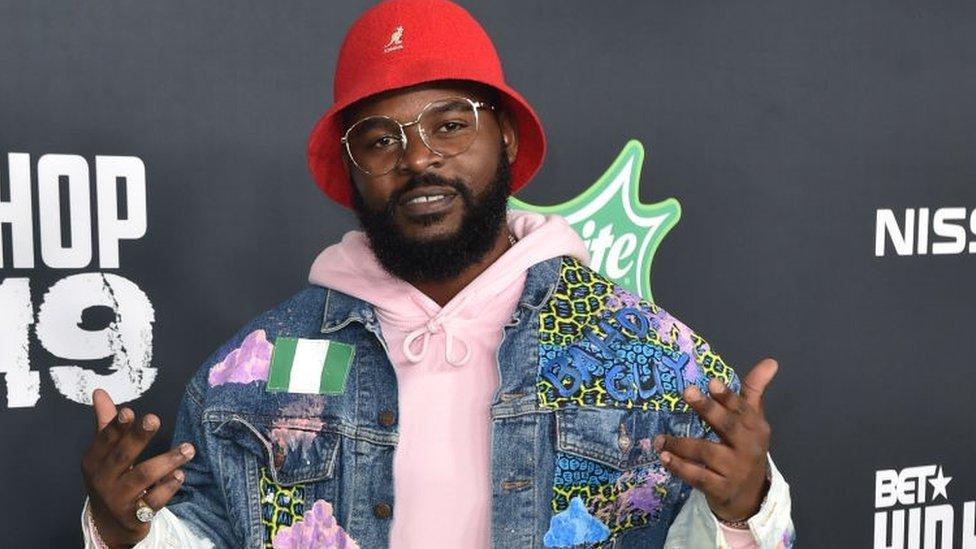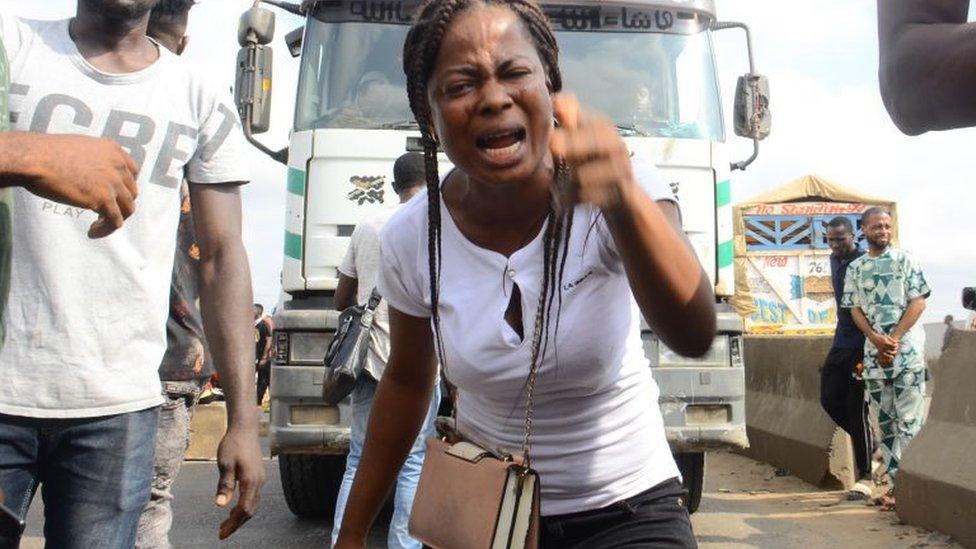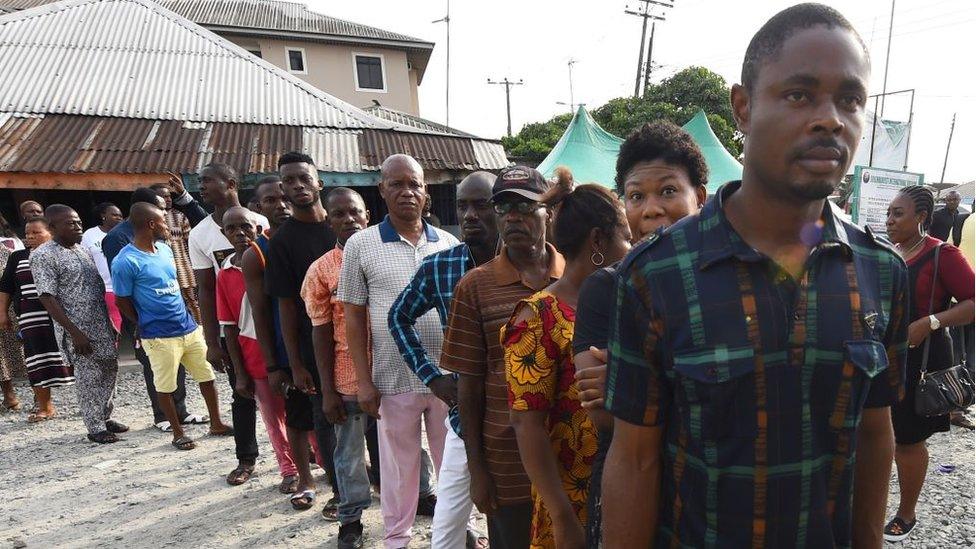Nigeria's Falz and Teni back Inec's voter registration drive
- Published

Rapper Falz proudly displayed the Nigerian flag at the 2019 BET Hip Hop Awards in the US city of Atlanta
In our series of letters from African writers, novelist Adaobi Tricia Nwaubani writes that many young Nigerians feel empowered and believe they can put their votes to good use in elections.

Thousands of Nigerians gathered at a free concert recently in the commercial hub of Lagos that was headlined by celebrities including rapper Falz and singer Teni.
The only requirement for entry was a permanent voter's card (PVC), which shows that the holder has registered to vote in next February's general elections.
"If you haven't registered yet, come and register at the venue on the day!! It's a critical moment for us. Tell someone to tell someone please. Prime entertainment meets civic responsibility," Falz wrote in an Instagram post.
Although the elections are eight months away, the concert, organised by the Independent National Electoral Commission (Inec), civil society group Yiaga Africa, and the European Union (EU), was just one of many drives to get more Nigerians to register to vote.
Social media influencers have been encouraging their followers to register. Religious leaders have been doing the same, with a Roman Catholic priest recently going viral for announcing to his congregants that they would be denied entry to Mass if they did not show their PVCs.
Popular videos have shown everyday people on buses, in their communities, and at different random venues, motivating others to register and get their PVCs.
Most of these efforts are aimed at the youth, who make up more than half of Nigeria's population of more than 200 million. Many of them will be first-time voters, as 18 is the voting age.
The anti-police brutality protests which swept across the country in October 2020, under the Twitter hashtag #EndSars, were mostly led by young people. Thousands of them took to the streets, sometimes bringing commercial activity to a halt.

Young Nigerians demonstrated their power during the anti-police brutality protests in 2020
That movement, although brought to an abrupt end by the brutal intervention of the Nigerian military, seems to have left the youth with a sense of empowerment which they feel can be put to good use in choosing who governs Nigeria next, after eight years of President Muhammadu Buhari.
"Ladies, if a guy asks for your number, ask him about his PVC," wrote popular #EndSars activist Rinu Oduala in a tweet, external to her more than 400,000 followers. "No PVC, no number."
But getting people to register is only a fraction of the job. In Nigeria's last presidential election in 2019, less than 35% of registered voters turned out to vote, according to Inec.
The election, during which Mr Buhari was elected for his second term, recorded the lowest turnout of voters since Nigeria's transition from military rule to democracy in 1999. And last year, Inec reported that in some by-elections, turnout was as low as 8.3%.

About 84 million people registered to vote in Nigeria's 2019 elections
Some Nigerians are put off by the torturous conditions under which voting often takes place.
People have been known to stand under the blazing sun for countless hours while waiting to cast their vote, especially when essential materials like ballot papers and boxes were delivered late to the polling unit, or when machines failed to function.
Sometimes, voting can become dangerous, with spontaneous gunshots and violence at polling stations.
At other times, people find it difficult to resist the temptation of selling their PVCs to politicians, deciding that the immediate gratification of a few thousand naira in cash is better than voting for someone who has made glowing electoral promises that they may never fulfil.
The candidate's agents who buy the PVCs are then free to collaborate with corrupt officials to manipulate figures at polling units.
With digitised votes, it should be more difficult for corrupt officials and candidates to manipulate results by altering figures"

Widespread corruption sometimes makes people worry that their votes may not count. Even if they defy all the obstacles to wait and fulfil their civic responsibility, the rigging that has plagued a number of Nigerian elections may render their effort a waste.
As a way to curb rigging, activists have been pushing for Nigerian elections to become digitised - and they will be in the elections due next year.
With digitised votes, it should be more difficult for corrupt officials and candidates to manipulate election results by altering figures.
Political parties are currently choosing their candidates, with the governing All Progressives Congress (APC) unveiling former Lagos governor Bola Tinubu as its candidate and the main opposition Peoples Democratic Party (PDP) selecting former Vice-President Atiku Abubaker.
Judging by comments on Twitter, the candidate making the most impact among the youth at the moment is the Labour Party's Peter Obi, who is generally regarded as forward-looking.
However, it is still far too early to say who young people will actually vote for, especially as only about three million Nigerians are registered on Twitter, external, according to analysis by fact-checking platform Africa Check.
There are millions more young people around the country whose voices are not represented on the microblogging platform, but who are qualified to vote.
For now, Inec's main focus is to get all of them to register. First-time voters and those who need to update their details have to register for each election.
"Please, assure me that you will register, pick up your PVCs and vote," said Inec head Mahmood Yakubu at the Lagos concert.
"I also assure you that your vote will count."

More Letters from Africa:

Follow us on Twitter @BBCAfrica, external, on Facebook at BBC Africa, external or on Instagram at bbcafrica, external

